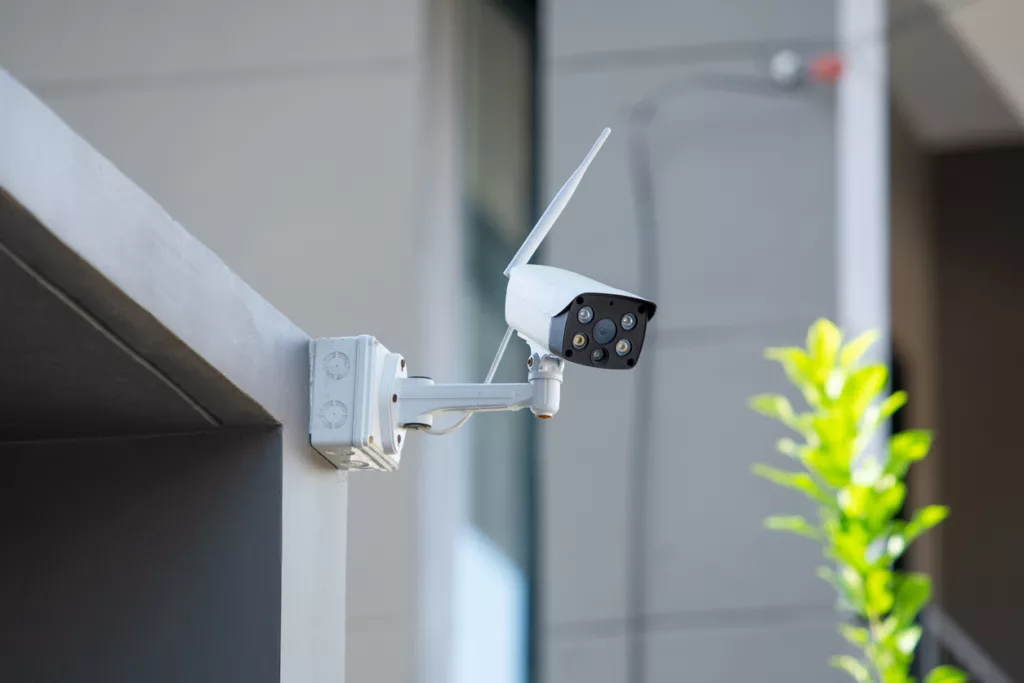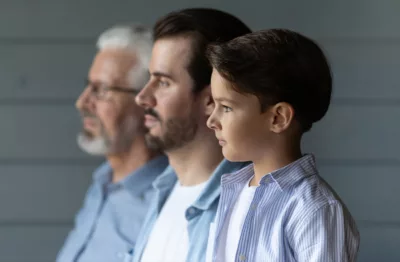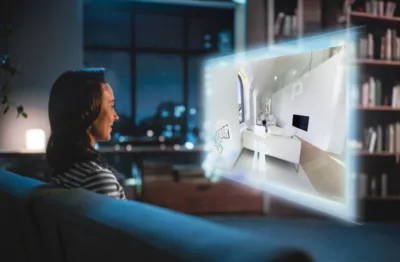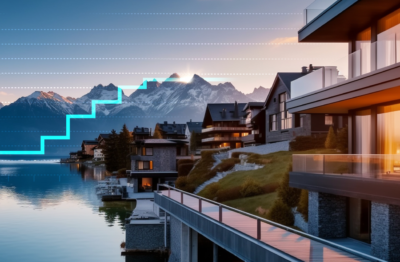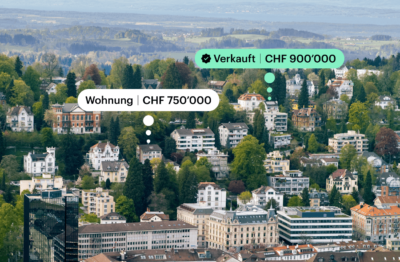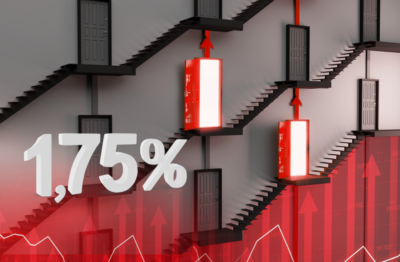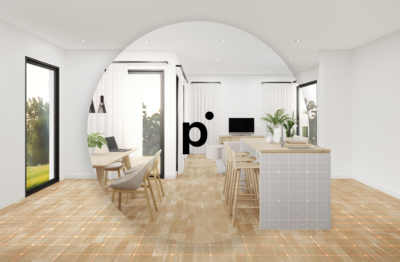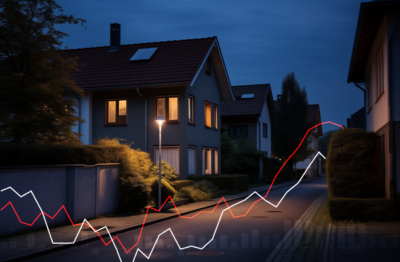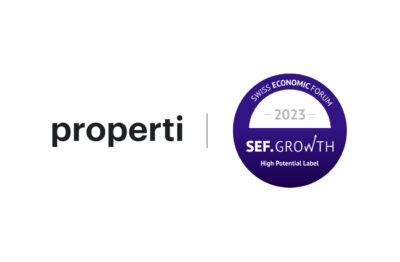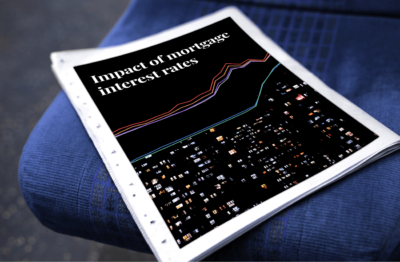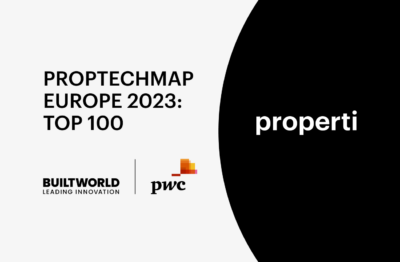Many private individuals want video surveillance in the interests of security. But is it actually legal to monitor your private property with a camera? Are landlords allowed to equip houses with video cameras? And what about data protection? An overview.
Table of contents
ToggleFrom October onwards, the number of burglaries in private buildings increases every year. Burglars take advantage of the early dawn to commit their crimes – according to police crime statistics, most burglaries take place between 4 and 8 pm. The good news is that the overall number of burglaries in Switzerland has been falling steadily for years, but there are still an average of 85 burglaries and thefts per day. Private detached houses and apartment buildings are most frequently affected. Whether it is permissible and how homeowners and landlords may use their property with cameras for surveillance and what rights apply to tenants will be clarified below.
Are you interested in the latest news and trends on the property market? In our newsletter you will receive free property knowledge conveniently in your mailbox.
In which cases may cameras be used to monitor private property?
In Switzerland, video surveillance is only permitted if it complies with the principles of legality and proportionality. In some cases, it is legitimate to use video surveillance cameras in rental properties. However, it is important to observe the Data Protection Act, which regulates the handling of personal data.
The question of whether it is permissible to equip a private house or property with surveillance cameras must therefore be judged in accordance with the provisions of the Data Protection Act. This supplements the legal basis for the protection of privacy, which in Switzerland is guaranteed by the Civil Code(Art. 28 ff. ZGB).
The collection of personal data by a video surveillance system is proportionate if there is no other, less intrusive measure that can guarantee security. So if protection against break-ins cannot be achieved by other means, the camera is permitted. However, options such as security doors, additional locks and an alarm system should be considered beforehand.
If the use of surveillance cameras is proportionate, the personal data obtained must be treated in accordance with Art. 12 et seq. FADP. This means that the tenant’s personality must not be violated.
The question of a surveillance camera in the apartment building is usually a matter of weighing up interests on a case-by-case basis. In Switzerland, there is no legal justification for installing a surveillance camera in a private home. Surveillance is only permitted without the tenants’ consent if there is a demonstrable, overriding private or public interest. Potential interests of generally recognized value include safety considerations as well as the monitoring of construction progress. On the other hand, there are the interests of the tenants with regard to the storage of images and videos – and thus their private data.
What are the requirements for using video surveillance?
Anyone wishing to use a surveillance camera must meet the following requirements for video surveillance:
- Video surveillance may only be used to protect people and property.
- Affected persons must be informed about the cameras with a visible sign; consent may be required.
- Surveillance cameras may only record images and videos that are absolutely necessary.
- The camera recordings may only be stored for as long as absolutely necessary.
- Recordings kept by the surveillance cameras must be protected against unauthorized access.
- Private surveillance cameras that record public places or public property are illegal.
In apartment buildings in particular, video surveillance may only be used if other, less intrusive measures such as alarm systems are demonstrably inadequate or cannot be implemented. The interference with privacy must be in reasonable proportion to the purpose pursued.
Before video surveillance goes too far: Whether you’re a homeowner or a tenant, there are a few pitfalls to avoid when dealing with your neighbors. This article contains several good tips on how to plan a pleasant neighborhood.
Installation and warning: How must video surveillance be made recognizable?
The Federal Data Protection and Information Commissioner of Switzerland offers fact sheets on video surveillance by private individuals. Among other things, it states that the structure of the surveillance camera implements the principles of proportionality, good faith and transparency.
This means that only the necessary images may appear in the camera’s recording field. In an apartment building, the camera is therefore not allowed to show who enters which apartment or who uses which letterbox.
Private video surveillance must be limited to your own property. The neighboring property may only be filmed by video with the consent of the neighbors. In an apartment building with rented or owner-occupied apartments, tenants must give their consent to be filmed.
Those responsible must inform all persons who enter the camera’s recording area of the surveillance system by means of a clearly visible sign. This also applies when filming via smartphone, Wi-Fi video camera or with certain apps. If the recorded images are stored, data controllers must also indicate to whom filmed persons can assert their right to information. This includes a means of contact, such as an email address.
Want to connect all your appliances – from your coffee machine to your robot lawn mower – wirelessly via Wi-Fi and control them remotely using your smartphone? In our article, you can find out about the benefits of smart home & smart living and how it can contribute to your security.
Data protection: How should those responsible handle the recordings?
According to the Swiss Federal Act on Data Protection, there are general principles of data protection that apply to all recordings in which specific or identifiable persons can be recognized. A surveillance camera continuously processes personal data, which can seriously encroach on the privacy of the people filmed.
The following requirements apply to video surveillance for all recordings in which the data collected could infringe the general right to privacy:
- Video camera recordings must be secure and protected from access by third parties.
- Ideally, the camera recordings are stored on a local hard disk with password protection.
- A 24-hour rule applies in stores, which means that the recordings should be deleted after 24 hours.
- In the private sector, recordings may also be kept for longer. Nevertheless, they should be deleted as quickly as possible.
- In the event of absences, such as vacations, the period for deleting the surveillance camera recordings can also be extended.
What applies to doorbell and doorbell cameras?
Many smart buildings now have a door and doorbell camera that shows who is ringing the doorbell. These surveillance cameras can also be connected to the WLAN via an app and controlled using a smartphone. Filming is only permitted in private areas. Public paths such as the sidewalk or neighboring properties must therefore not be visible on the camera recordings.
Do you need help with marketing, letting or searching for a property? Our experts will support you from A to Z and are available to answer any questions you may have about property and smart living concepts.
All data are without guarantee. The information on these Internet pages has been carefully researched. Nevertheless, no liability can be assumed for the accuracy of the information provided.
